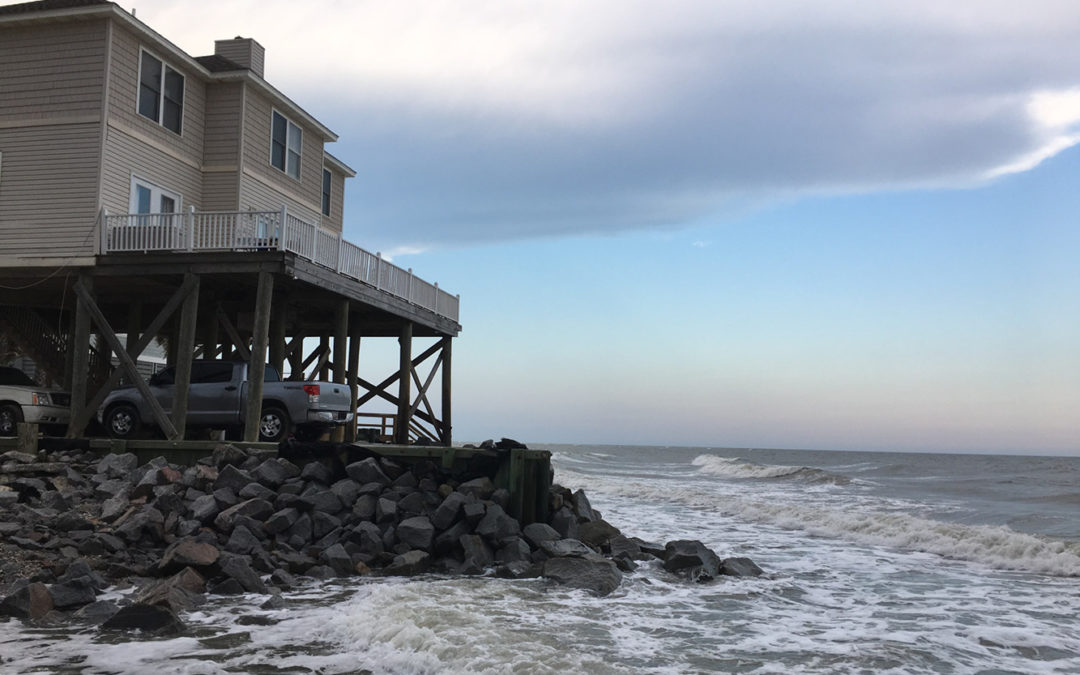To develop or not to develop ‘superbeach’ houses?
By Bill Davis | Contributing Writer
The City of Folly Beach, and the community its government represents and serves, is in a pickle.
Due to ongoing renourishment efforts, three more “super beachfront” lots, or properties where a house could be built on the oceanfront but doesn’t have direct access to the roadways, could be built in the near future.
Critics worry that if the city allows more super beachfront properties, it could harm the beach and the turtles that call it home, create septic problems, and end up costing the city money once the new sand washes away.
If the city blocks the development, it could face up to $2 million in a “takings” lawsuit by aggrieved property owners. And that would take a big, big bite out of the city’s annual budget, which weighs in at just under $6 million in revenues for the current fiscal year.
“Somehow, we have to strike a balance between all those parties,” says city planning director Aaron Pope.
Pope is inviting everyone in the community to attend the city’s scheduled meetings as staff and City Council work on how to solve the riddle. And it’s a riddle with two sides: oceanfront and marshfront setback development lines.
The first meeting will be held Monday, Aug. 6 at 7 p.m. to introduce proposals for beachfront ordinance changes.Then on Wednesday, Aug. 15 at 6 p.m., public input will be welcomed for the city’s marshfront management plan.
A work session on the beachfront proposals will be held Monday, Aug. 20 at 7 p.m., and on Monday, Sept. 10, initial proposals for marshfront changes will be submitted.
The final drafting of recommendations from Pope’s office will be made in November, with Council opening the process to the public for comment, with an expected series of public hearings and adoption planned for early next year.
Local resident Paula Stubblefield is encouraging everyone to show up for the meetings, as she is helping direct Save Folly Beach, a community-based organization dedicated to blocking more super beachfront development.
Stubblefield and her boyfriend Matt Napier already have a front-row seat, as their Ashley Avenue home sits directly behind a super beachfront lot on which the owners plan to build. Additionally, the owners also own the lots on either side of Stubblefield and Napier and in front of those two lots, as well.
“After speaking to many, many people on Folly, it’s clear that everyone on Folly Beach wants to enjoy the beach rather than have more development that destroys the beach,” says Stubblefield. “The few dollars extra that the city receives in tax revenue will be offset by significantly higher costs of protecting these houses.”
Stubblefield worries that once renourishment is completed, everyone will forget the problem with eroding beach sand. That is until the next time the ocean washes away portions of the beach, and the waves and rock walls make it impossible to walk your dog along the beach without wading into the ocean.
Stubblefield, whose current view of the ocean could soon be blocked, says the city has a history of “caving in” whenever it’s faced with a lawsuit.
“Super beachfront houses are like hot potatoes: people keep passing them to new owners who don’t know what they’re buying and the one holding the property during a hurricane will be the one who gets burnt and loses everything,” says Stubblefield.
“As soon as developers build on super beachfront lots and then sell the houses, these houses become the City of Folly Beach’s problem in perpetuity,” she says.
Folly Beach Mayor Tim Goodwin is facing a choice of killing the golden goose, the beach, or the city shelling out as much as $2 million to protect a person’s right to own property.
He admits that septic systems along the beachfront and marshfront “is not an easy subject.” But, the mayor points out, that Stubblefield’s property is on a septic, too.
Goodwin holds that the brouhaha over beachfront development cost his predecessors an election, so he knows the situation is critical.
Kennedy, who also owns Fred Holland Realty, says that if the city wants to stop development on the lots, they can. “But they better be prepared to pay for them.”
Kennedy also knows well one of the owners of the lots surrounding Stubblefield. “He is a real estate agent who works for me.”
John Cantwell owns and co-owns the five lots surrounding Stubblefield’s property with a business partner who lives in Columbia.
And he definitely plans to build on all of the lots. Cantwell could have already begun construction, if it weren’t for the current building moratorium on Folly that he says came up too quickly for him to act.
If the city wants to stop him, they better get out their checkbook or hire a big-time lawyer. “I haven’t had the lots appraised, but each of them would be in the $650,000 range,” says Cantwell.
Cantwell says he knows the mayor and the planning commission and council are all just trying to do what’s best for everyone. “But like I said to the mayor, why now? It’s not really fair to me.”


